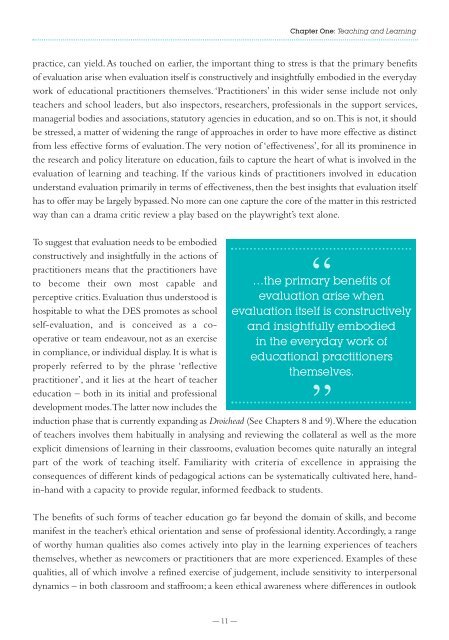Towards a Better Future
A Review of the Irish School System John Coolahan | Sheelagh Drudy Pádraig Hogan | Áine Hyland | Séamus McGuinness
A Review of the Irish School System
John Coolahan | Sheelagh Drudy Pádraig Hogan | Áine Hyland | Séamus McGuinness
Create successful ePaper yourself
Turn your PDF publications into a flip-book with our unique Google optimized e-Paper software.
Chapter One: Teaching and Learning<br />
practice, can yield. As touched on earlier, the important thing to stress is that the primary benefits<br />
of evaluation arise when evaluation itself is constructively and insightfully embodied in the everyday<br />
work of educational practitioners themselves. ‘Practitioners’ in this wider sense include not only<br />
teachers and school leaders, but also inspectors, researchers, professionals in the support services,<br />
managerial bodies and associations, statutory agencies in education, and so on. This is not, it should<br />
be stressed, a matter of widening the range of approaches in order to have more effective as distinct<br />
from less effective forms of evaluation. The very notion of ‘effectiveness’, for all its prominence in<br />
the research and policy literature on education, fails to capture the heart of what is involved in the<br />
evaluation of learning and teaching. If the various kinds of practitioners involved in education<br />
understand evaluation primarily in terms of effectiveness, then the best insights that evaluation itself<br />
has to offer may be largely bypassed. No more can one capture the core of the matter in this restricted<br />
way than can a drama critic review a play based on the playwright’s text alone.<br />
To suggest that evaluation needs to be embodied<br />
constructively and insightfully in the actions of<br />
practitioners means that the practitioners have<br />
to become their own most capable and<br />
perceptive critics. Evaluation thus understood is<br />
hospitable to what the DES promotes as school<br />
self-evaluation, and is conceived as a cooperative<br />
or team endeavour, not as an exercise<br />
in compliance, or individual display. It is what is<br />
properly referred to by the phrase ‘reflective<br />
practitioner’, and it lies at the heart of teacher<br />
education – both in its initial and professional<br />
development modes. The latter now includes the<br />
“<br />
…the primary benefits of<br />
evaluation arise when<br />
evaluation itself is constructively<br />
and insightfully embodied<br />
in the everyday work of<br />
educational practitioners<br />
themselves.<br />
”<br />
induction phase that is currently expanding as Droichead (See Chapters 8 and 9). Where the education<br />
of teachers involves them habitually in analysing and reviewing the collateral as well as the more<br />
explicit dimensions of learning in their classrooms, evaluation becomes quite naturally an integral<br />
part of the work of teaching itself. Familiarity with criteria of excellence in appraising the<br />
consequences of different kinds of pedagogical actions can be systematically cultivated here, handin-hand<br />
with a capacity to provide regular, informed feedback to students.<br />
The benefits of such forms of teacher education go far beyond the domain of skills, and become<br />
manifest in the teacher’s ethical orientation and sense of professional identity. Accordingly, a range<br />
of worthy human qualities also comes actively into play in the learning experiences of teachers<br />
themselves, whether as newcomers or practitioners that are more experienced. Examples of these<br />
qualities, all of which involve a refined exercise of judgement, include sensitivity to interpersonal<br />
dynamics – in both classroom and staffroom; a keen ethical awareness where differences in outlook<br />
— 11 —



